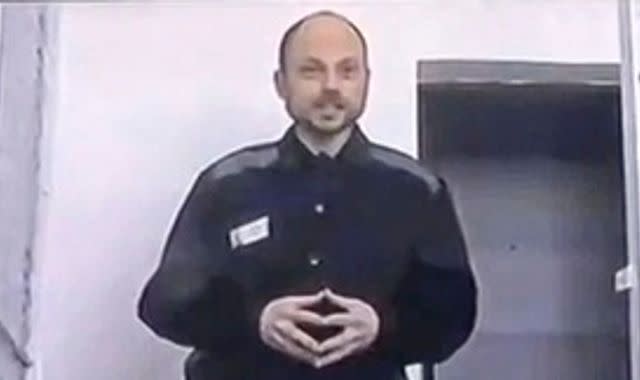Pale, drawn and behind bars, what remains of Russian opposition's attempts to rally supporters

This is a glimpse of what remains of Russia's opposition through the stuffy, bureaucratic prism of a Moscow courtroom.
The protagonist is pale and drawn but invariably defiant, cuffed in a glass cage, or beamed in via grainy video-link, from a faraway jail.
At the start a small crowd huddles as close as they can to wherever the defendant is, sending waves and messages of support through the glass or down the airwaves and the thousands of miles in between.
Proceedings are conducted in the sped-up dreary monotone in which Russia's judiciary specialises. The defendant invariably loses.
This Thursday, it is 42-year-old Vladimir Kara-Murza on the screen from a jail cell in the Siberian city of Omsk.
He is a Russian-UK dual national who is finishing the first year of a 25-year sentence on treason charges.
Since Alexei Navalny's death last Friday, he is Russia's most prominent political prisoner.
"There has been a lot of despondency and despair in recent days which is understandable," he tells his supporters before proceedings begin.
"But if we fall into despondency and despair we will give them what they want. We owe it to our late comrades to keep fighting with even more strength, to realise what it is they lived and died for."
He has filed a complaint against the Russian authorities for failing to investigate either of two occasions in which he was poisoned, once in 2015 and again in 2017.
Both times he fell into a coma and suffered multiple organ failure.
Both times his wife, Evgenia, was told he had a five per cent chance of survival.
Kara-Murza believes he was targeted by the Russian state because of his ceaseless campaigning for tighter Western sanctions against Vladimir Putin's regime.
He tells the court he believes there is an FSB death squad tasked with hunting down Kremlin opponents, which the investigative outlet Bellingcat alongside "Der Spiegel" has helped identify.
Maria waits with us outside as the judge makes his deliberations.
She is a friend of Kara-Murza's 90-year-old grandmother and is there on her behalf.
Maya Kara-Murza's father was shot during Stalin's repressions. Maya was sent to an orphanage at the age of four as the daughter of an "enemy of the people".
She knows what repression looks like.
"She is an extraordinarily courageous woman," Maria says.
"Whenever I need courage, I go to her."
Now her grandson is serving the longest sentence meted out to any political dissident since Soviet times.
Zlata, not her real name, has also come to show her support.
She says it is all she can do - attend cases like this, write letters or bring food or clothes to political prisoners, lay flowers for Navalny - as long as the police aren't too jumpy.
"I want to live in this country, I love this country, I love the people," she says.
"I just need to find ways to stay safe and stay out of prison. I don't want to go abroad."
Read more from Sky News:
Wake up to Russian threat, Estonia's weekend warriors tell UK
Russia pulls out of fishing deal and tells Britons to 'lose weight'
Navalny's death hangs like the darkest of clouds, a fog of pain and depression over anyone who has ever considered themselves opposition in Russia or in exile, as so many of his supporters now are.
But Zlata's face brightens at the mention of his widow, Yulia Navalnaya who has promised to continue her husband's legacy.
"I thought, whatever this woman says, I will do it," she says.
That is what Navalnaya has given back: hope where it was gone, a figure as charismatic as her husband in whom to vest what remains of that dream that kept the opposition going; that there might one day be a Russia without Putin, that Russia will be free - the slogans of every Navalny demonstration over the past decade and more.
But hope is still hard to access.
Maria Eismont represents Kara-Murza, just as she has many other political activists over the years. It is a dangerous job.
Three of Navalny's lawyers have been locked up and many other human rights lawyers have fled the country.
She says she doesn't know what she feels in relation to Navalny's death.
"I'm like in a dream. I don't feel anything."
She searches for a quote.
"Viktor Frankl (the holocaust survivor) - he was saying that the first to die are those who thought it would end quickly.
"The second are those who thought it would never end. And those who survived were those who just on an everyday basis, tried to do something that was in their strength.
"I think it's very wise advice and I really try to follow it."
The legal endings to the stories of those she defends have almost invariably all been written.
Their fates are then entirely at the hands of a state that has proven itself over and over again appallingly cruel to those who oppose it.
And yet Eismont tirelessly goes through the motions because it is what she does. It is the bravery of those who see meaning, if not hope, in what they do.
It is as Navalny said: "Everything will be OK. And even if it isn't, we'll have the consolation of having lived honest lives."


